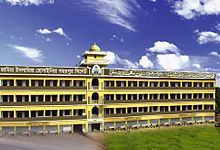Nur Uddin Gohorpuri
Nur Uddin Gohorpuri | |
|---|---|
 | |
| Title | Maulana,Allamah,Shaikh-ul-Hadith |
| Personal | |
| Born | 1924 |
| Died | 26 April 2005 (aged 81) |
| Resting place | Gohorpur,Balaganj Upazila,Sylhet District,Bangladesh |
| Religion | Islam |
| Era | Modern |
| Movement | Deobandi |
| Alma mater | Darul Uloom Deoband |
| Profession | Islamic scholar,teacher |
| Muslim leader | |
| Predecessor | Habibur Rahman Raipuri |
| Successor | Ghiyasuddin Baliya |
Influenced by
| |
| Profession | Islamic scholar,teacher |
Nur Uddin Ahmed Gohorpuri(Bengali:নূর উদ্দিন আহমদ গহরপুরী;1924 – 26 April 2005) was aBengali Muslimreligious scholar and teacher. He was notable for his association withQawmi madrasasinBangladeshas well as for having been the founder ofGohorpur Hussainia Madrasa.
Early life
[edit]
Gohorpuri was born in 1924 to aBengalifamily in the Mullahpara of Shiorkhal in Gohorpurpargana,located in what is nowSylhet District,Bangladesh.His father was Mawlana Zahur Uddin Ahmad and his mother was Suratunnesa.[2]
Education
[edit]He studied at a localmaktabin Sultanpur. Following the death of his father, who had been a scholar, Gohorpuri was given at a young age to Bashir Uddin Shaykh-e-Bagha, a religious figure, to be trained as his disciple. He continued his studies in Purbabhag Madrasa in Jalalpur and Bagha Alia Madrasa where he finished his third year. Bashir Uddin helped him enrol inDarul Uloom Deoband,where Gohorpuri was taughthadithbyHussain Ahmed Madani,who had been Bashir Uddin's teacher. Following his graduation in 1950, Gohorpuri became one of Madani's pupils himself.[2][3]In 1950, he set a world record by passing the title from the world-renowned Darul Uloom Deoband and securing the first place in the merit list.[4]
Career
[edit]In 1952, uponIzaz Ali Amrohiand Madani's instructions, he became employed as ahadithscholar at the Pangasia Alia Madrasa inBarisalfor two years, before transferring to perform the same role at the Balia Ashraful Uloom Madrasa inMymensingh.In 1956, he returned to his native village and founded theGohorpur Hussainia Madrasa,serving there as the hadith scholar andmuhtamim(principal) for the remainder of his life.[2][3]It later became one of the most prominent Islamic educational institutions in Bangladesh.[5]
During the 1960s, Gohorpuri joined theJamiat Ulema-e-Islampolitical party. He contested for a seat at theNational Assemblyduring the1970 Pakistani general electionbut was unsuccessful. Gohorpuri was elected chairman ofBefaqul Madarisil Arabia Bangladeshin 1996, becoming associated with more than 50Qawmi madrasasas well as being the founder and patron of 13.[3]
Death and legacy
[edit]Gohorpuri died on 26 April 2005 at the age of 81. He left behind four wives, four daughters and a son, Muslehuddin Raju, the latter of whom succeeded him as head of Gohorpur Hussainia Madrasa.[2][6]His funeral in front of his home in Gohorpur was attended by several thousand of his pupils.[3]
References
[edit]- ^al-Mahmud, A.H.; Hasan, Syed Mahmudul (2008).সুন্নাতে নববীর মূর্ত প্রতীক: মাওলানা আব্দুল মতিন চৌধুরী শায়খে ফুলবাড়ী রাহ(in Bengali). Sylhet: al-Medina Offset Press. p. 45.
- ^abcd"আল্লামা নুর উদ্দিন আহমদ গহরপুরীর মৃত্যু বার্ষিকী আজ".Sylhet Report(in Bengali). 26 April 2019. Archived fromthe originalon 10 June 2020.Retrieved10 June2020.
- ^abcd"আল্লামা গহরপুরী পরিচিতি".গহরপুর হোসাইনিয়া মাদ্রাসা(in Bengali). Archived fromthe originalon 17 June 2020.Retrieved17 August2019.
- ^Muhammad Ruhul Amin Nagori, "আল্লামা নূরঊদ্দীন আহমদ গহরপুরী (র.)",জীবনী(in Bengali), As Siraz
- ^"সিলেট গহরপুর জামিয়ার বার্ষিক মাহফিল বৃহস্পতিবার".Barta24(in Bengali). 18 December 2018. Archived fromthe originalon 12 June 2020.Retrieved12 June2020.
- ^"গহরপুর জামিয়ার কওমি গ্র্যাজুয়েশন থেকে সনদ নিলেন তরুণ আলেমরা".Banglanews24.com(in Bengali). 25 February 2017. Archived fromthe originalon 12 June 2020.Retrieved12 June2020.
